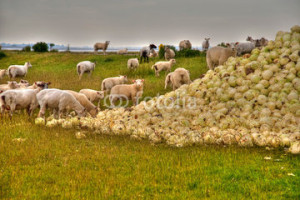 In the following two decades, most listeriosis outbreaks involved foods of animal origin, e.g., deli meats, hot dogs, and soft cheeses. L. monocytogenes serotype 4b, especially epidemic clones I, II, and Ia, were frequently implicated in these outbreaks. However, since 2008 several outbreaks have been linked to diverse types of fresh produce: sprouts, celery, cantaloupe, stone fruit, and apples. The 2011 cantaloupe-associated outbreak was one of the deadliest foodborne outbreaks in recent U.S. history.
In the following two decades, most listeriosis outbreaks involved foods of animal origin, e.g., deli meats, hot dogs, and soft cheeses. L. monocytogenes serotype 4b, especially epidemic clones I, II, and Ia, were frequently implicated in these outbreaks. However, since 2008 several outbreaks have been linked to diverse types of fresh produce: sprouts, celery, cantaloupe, stone fruit, and apples. The 2011 cantaloupe-associated outbreak was one of the deadliest foodborne outbreaks in recent U.S. history.
This review discusses produce-related outbreaks of listeriosis with a focus on special trends, unusual findings, and potential paradigm shifts. With the exception of sprouts, implicated produce types were novel, and outbreaks were one-time events. Several involved serotype 1/2a, and in the 2011 cantaloupe-associated outbreak, serotype 1/2b was for the first time conclusively linked to a common-source outbreak of invasive listeriosis. Also in this outbreak, for the first time multiple strains were implicated in a common-source outbreak.
In 2014, deployment of whole genome sequencing as part of outbreak investigation validated this technique as a pivotal tool for outbreak detection and speedy resolution. In spite of the unusual attributes of produce-related outbreaks, in all but one of the investigated cases (the possible exception being the coleslaw outbreak) contamination was traced to the same sources as those for outbreaks associated with other vehicles (e.g., deli meats), i.e., the processing environment and equipment. The public health impact of farm-level contamination remains uncharacterized.
This review highlights knowledge gaps regarding virulence and other potentially unique attributes of produce outbreak strains, the potential for novel fresh produce items to become unexpectedly implicated in outbreaks, and the key role of good control strategies in the processing environment.
Fresh produce–associated listeriosis outbreaks, sources of concern, teachable moments, and insights
Journal of Food Protection®, Number 2, February 2016, pp. 184-344, pp. 337-344(8)
Garner, Danisha; Kathariou, Sophia
http://www.ingentaconnect.com/content/iafp/jfp/2016/00000079/00000002/art00020


.jpg) There’s lots of various E. coli out there
There’s lots of various E. coli out there